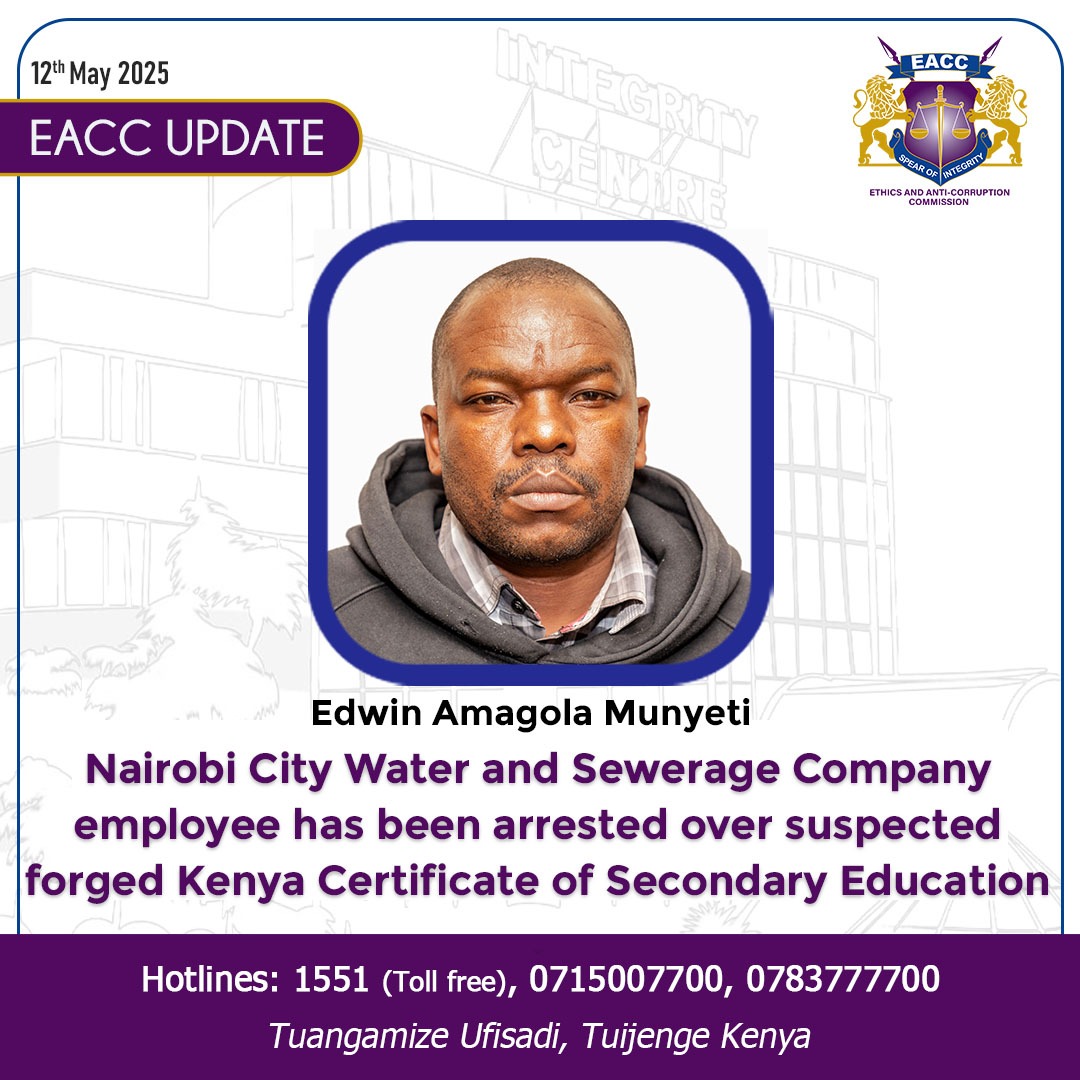Investigations
Forged KCSE Certificate Scandal Exposed as EACC Nabs County Worker Who Pocketed Over Ksh9 Million

A county job. A fake KCSE certificate. And over Ksh9 million in taxpayer money down the drain.
This is the latest scandal shaking the Nairobi City Water and Sewerage Company (NAWASCO) after the Ethics and Anti-Corruption Commission (EACC) nabbed one of its employees, Edwin Amagola Munyeti, for using forged academic credentials to secure a high-paying position.
The arrest exposes a deep rot in public recruitment processes and signals a crackdown on fake qualifications in government agencies.

The commission stressed that using forged documents to gain public office is not just fraud; it is theft of public resources and an abuse of public trust. [Image: X/EACC]
EACC Uncovers Shocking Forged KCSE Certificate Scam
The EACC arrested Edwin Amagola Munyeti, a staff member at NAWASCO, for using a forged Kenya Certificate of Secondary Education (KCSE) certificate to secure employment at the utility company.
Investigations revealed that Munyeti submitted the fake document, allegedly issued by the Kenya National Examinations Council (KNEC), during his job application.
This forged KCSE certificate opened the door to a position that earned him a total of Ksh9,061,398 between March 2010 and December 2023.
For nearly 14 years, Munyeti enjoyed the benefits of a legitimate employee — a steady income, allowances, and public trust — all built on deception.
The matter came to light after a tip-off prompted the anti-graft agency to verify the authenticity of the academic documents submitted. Upon cross-checking with KNEC, EACC confirmed that the KCSE certificate in Munyeti’s file was not genuine.
In an official statement, EACC disclosed, “The Commission launched investigations following allegations that the accused used a forged Kenya Certificate of Secondary Education (KCSE) certificate, falsely presented as genuine and issued by the Kenya National Examinations Council (KNEC), to secure employment at the Nairobi City Water and Sewerage Company.”
After concluding its investigation, EACC forwarded the file to the Office of the Director of Public Prosecutions (ODPP), which recommended prosecution.
Legal Trouble Looms Over the Use of Forged KCSE Certificate
Munyeti now faces a litany of serious charges. He is likely to be prosecuted for forgery under Section 349 of the Penal Code, which carries a jail term of up to three years, a fine, or both.
Also, under Section 41 of the Anti-Corruption and Economic Crimes Act (ACECA), knowingly giving false information to a principal (in this case, the employer) to gain employment is punishable by up to 10 years in prison.
The charges do not end there. The EACC is also pushing for Munyeti to be held accountable for the fraudulent acquisition of public property — the Ksh9 million he unlawfully earned.
The commission stressed that using forged documents to gain public office is not just fraud; it is theft of public resources and an abuse of public trust.
Legal experts note that this case could set a precedent for how aggressively authorities pursue similar crimes.
It also exposes the gaps in recruitment systems within county governments and state agencies, many of which still fail to conduct proper vetting of documents submitted by job applicants.
Case of Fake Academic Credentials Becoming Alarmingly Common
Munyeti’s case is not isolated. In fact, it comes just weeks after EACC exposed another major scandal involving forged academic certificates.
In March, investigators discovered that four former officials of the Independent Electoral and Boundaries Commission (IEBC) had forged certificates to secure jobs and fraudulently earned over Ksh35 million in salaries.
This rising trend points to a growing problem of individuals bypassing academic qualifications through forged KCSE certificates and other fake documents to secure public jobs.
It also signals the need for all government institutions to collaborate with bodies like KNEC and the Kenya National Qualifications Authority (KNQA) to verify credentials before hiring.
The cost of inaction is clear. Unqualified individuals handle sensitive roles, genuine job seekers miss opportunities, and corrupt officials drain public funds.
EACC has emphasized the importance of vigilance and routine audits, warning that this is just the beginning of more arrests and public exposures. “The war against corruption must also target fraudulent entry into public service,” the commission stated.
Kenya Insights allows guest blogging, if you want to be published on Kenya’s most authoritative and accurate blog, have an expose, news TIPS, story angles, human interest stories, drop us an email on [email protected] or via Telegram
-

 Investigations3 days ago
Investigations3 days agoVISA CARTEL EXPOSED: Community Leaders Demand Immediate Arrests as Immigration Boss Allegedly Boasts of Weekly Political Kickbacks
-

 Business1 week ago
Business1 week agoSafaricom’s Sh115 Trillion Data Breach Scandal: How Kenya’s Telecom Giant Sold Out 11.5 Million Customers
-

 Investigations4 days ago
Investigations4 days agoEXPOSED: The Visa Cartel Bleeding Kenyans Dry – How Immigration Boss Turned Government Office Into Personal Cash Cow
-

 Investigations1 week ago
Investigations1 week agoDEATH TRAPS IN THE SKY: Inside the Sordid World of West Rift Aviation’s Deadly Corruption Cartel
-

 Investigations1 day ago
Investigations1 day ago“I Contribute Sh4 Million Every Weekend”: Immigration Boss Evelyne Cheluget Exposed in Explosive Visa Cartel Scandal as Somali Community Delivers Damning Evidence to Authorities
-

 Business2 weeks ago
Business2 weeks agoBillionaire: Inside Raila Odinga’s Vast Wealth
-

 News2 weeks ago
News2 weeks agoMaurice Ogeta, Raila’s Bodyguard: The Shadow Who Became The Story
-

 Business1 week ago
Business1 week agoWhy Kenyan Investors Should Pay Attention to the U.S. Stock Market (US30 Index)













